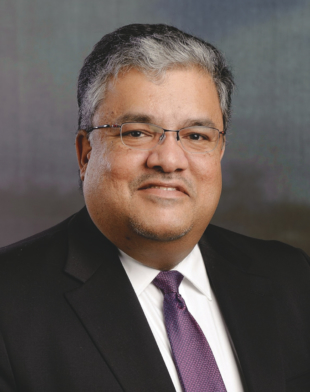The hangover from the COVID-19 pandemic continues to be felt the world over, but across different countries, the rate of recovery can vary markedly. The Caribbean state of Trinidad and Tobago is a case in point. Experiencing consistent growth, the country’s economy suddenly found itself impacted by declining international oil prices and energy costs, both of which severely dented government revenues.

“As a result of the very different economic environment we found ourselves in, the government of Trinidad and Tobago undertook a number of initiatives to reduce expenditure, while looking at opportunities to increase revenue,” Minister of Public Utilities Marvin Gonzales explained.
These initiatives have proved central to the government’s continued provision of health care services for its citizens and education opportunities for its students. At the same time, it has enabled the government to maintain contributions to its Heritage and Stabilization Fund, while running a large social security network to provide for its most vulnerable citizens.
The responsibility for providing some of these support services lies with Trinidad and Tobago’s Water and Sewage Authority, which, alongside its mandate to improve the reliability and capacity of the country’s water supply, boasts initiatives related to public health and education. In the former case, for example, WASA monitors the quality of the nation’s water supply on a daily basis to ensure it meets both national and global standards.
In the aftermath of the pandemic, grants and low-interest loans helped insulate small and midsize businesses from the harshest effects of the lockdowns, while the Heritage and Stabilization Fund provided further support to the islands’ economy and citizens: “When you look at our economic performance compared to all of the countries in the Caribbean, Latin America and North America, Trinidad and Tobago performed far better because of the systems that we put in place during the pandemic,” Gonzales added.
A landmark renovation
The impact of the COVID-19 pandemic demonstrated the importance of good health to people around the world. This is something that the government of Trinidad and Tobago has long prioritized, with a particular focus on its water supply. Three years ago, just 32% of the country had an uninterrupted supply of water. However, thanks to government initiatives on infrastructure renewal investment, and the construction of new water treatment plants in strategic areas around the country, this figure has recently risen to over 50%.

In part, these improvements are the result of Trinidad and Tobago’s embrace of smart technologies to modernize its water and sewage networks: “We will be updating our water treatment plants to bring them up to a modern standard,” WASA Chairman Ravindra Nanga said. “We will be introducing widespread technology and looking to develop a smart water network to enable proper monitoring and preventative maintenance.”
To ensure the country’s water, waste and health care services are fit for the 21st century, the government relies on modern, agile and technology-driven authorities. One of these is the Trinidad and Tobago Solid Waste Management Co. Ltd., which boasts a circular economy action plan that aims to align economic growth and sustainable development. This covers waste collection, landfill management, community education programs, land reclamation, research and much more.
SWMCOL’s vision is to be a world-class company that simultaneously builds and empowers nations and the sustainability of their environments. To support this objective, it works closely with leading international organizations to make sure its practices contribute to achieving the United Nations sustainable developmental goals.
According to SWMCOL CEO Sean de Souza, “Together, we will deliver and execute sustainable environmental strategies for the Caribbean and, by extension, the big blue world.”
The country’s commitment to sustainability was also clearly on show during the Water Loss Conference at the Hilton Trinidad in March 2023. The event was the first of its kind to be held in the Caribbean, attracting over 300 delegates from the region and around the world to examine water loss and initiatives to lower carbon footprints in the context of climate change.
“As a result of the Water Loss Conference, we were able to examine climate-smart technology and innovations that can reduce the need for extreme pumping across our network and reduce the consumption of electricity when managing leaks,” Gonzales said.
Attracting outside support
As impressive as the sustainable progress made by Trinidad and Tobago is, the country would be the first to admit it has not achieved its successes in isolation. For instance, it recently negotiated a loan arrangement with the Inter-American Development Bank for $80 million. That money will go toward reducing water loss across WASA’s infrastructure, as well as the creation of a smart water network. The authority is also aiming to put the funds toward expanding the water supply in critical areas around the country.
These funds are being augmented by investment and support from overseas. This includes partnerships — both private and public — from across the region and the wider world. For instance, the government is currently looking to collaborate with international partners to invest in wind energy following the completion of feasibility studies across Trinidad and Tobago.
“The green agenda is very important to us,” Gonzales said. “Where we can, we are looking to diversify and transition our electricity generation sector from hydrocarbons to renewable sources of energy.”
Climate change is a global problem — one that can only be tackled by different stakeholders coming together. Trinidad and Tobago supports this through its work with partners around the world, including Japan. The country has a long-standing relationship with Toshiba Corp. and is interested in pursuing further collaborations with Japanese engineers, who possess both the work ethic and technical proficiency to support WASA’s modernization efforts.
“Trinidad and Tobago is open for business,” Nanga said. “We welcome any and everyone to assist us with our objective to improve the sustainability of our services. We look forward to developing partnerships with Japanese companies and individuals to support our drive to introduce new technology at WASA. We are more than willing to engage with the Japanese people to improve our services. Hopefully, we can provide some benefit to them as well.”
https://info.japantimes.co.jp/international-reports/pdf/20240115-GI-Trinidad-and-Tobago.pdf
www.global-insight.net




